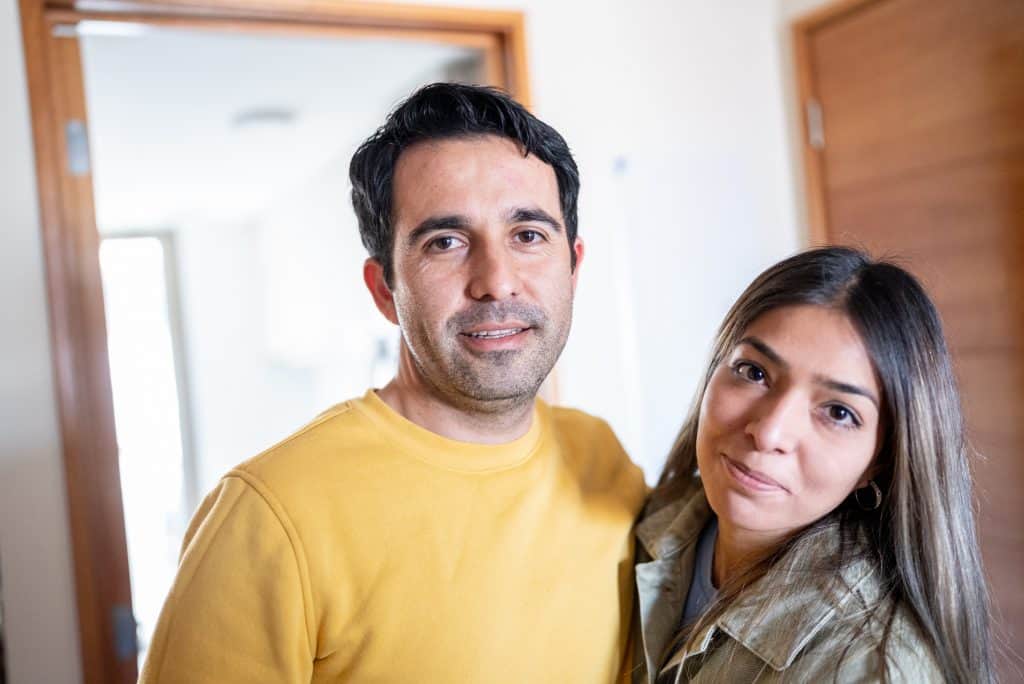“I used to dream that I would meet a prince
But God Almighty, have you seen what’s happened since?”
-Madame Thenardier, Les Miserables
One of the things I dislike about most Disney princesses is that they sell a myth: that happily-ever-after is part and parcel of the wedding night. Sure, there’s a struggle for happiness—every Belle has her Beast—but in most fairy tales or Disney romances, the prince fights the dragon before he rescues the princess.
But what if he doesn’t? What if the dragon doesn’t show up until well after the wedding night? Or what if the husband brings the dragon into the marriage with him?
This is how it feels to many wives when their husbands use pornography.
Catch ’em red handed
Over the years we’ve gotten a number of phone calls from hurting wives who have discovered or suspect their husbands are using porn. Often these wives (and occasionally husbands) simply want help understanding and responding to their porn-using spouses. While I can’t say we love getting that phone call—after all, these stories are heartbreaking—we do like being able to hand them tools to be used for reconciliation.
Sometimes the “need to know” what their husbands are seeing online is overwhelming. The secrecy of their husbands’ online lives is like the pebble in their shoe that will not go away.
So they call in and ask for help to hide our software on their computer.
If you’re one of these women (or men), we understand. You’re in a hard place. But here’s a tip. If you want to spy on your spouse, don’t use Covenant Eyes.
No, really, don’t. Covenant Eyes is designed for open communication. In fact, it’s designed to be obvious that it’s installed.
In our experience, it rarely turns out well when one person spies on another. You might know what your husband is doing online, but at what price? Spying often only results in distrust and hurt feelings, not restoration.
So then, what should you do instead?
If you want to bring healing and reconciliation back into your marriage, you should ask your husband to become accountable for his Internet use. This means that someone will be keeping an eye on his Internet use, not as a cop who is out to catch him, but as a friend who wants to see him grow and change. This person can then work to affirm him as he makes positive changes and encourage him when he fails.
Note that I said “someone.” While you might feel you will be able to handle seeing every temptation your husband encounters and every click he makes, in hindsight many wives don’t like receiving Internet use reports for their struggling husband. Of course, it should be your choice (not just his choice) of how much information you want to know about your husband’s online activities, but your husband will benefit greatly from having other men hold him accountable.
After all, in reality, your husband—even if he’s repentant—will likely slip up. You might be shocked by how often he struggles with lust online. You need to ask yourself: Will seeing him fail cause us both great pain and discouragement? Will I start feeling like I’m “parenting” him or being the Internet police? However, someone outside your marriage, a friend or group of friends you both trust, will be able to react from a position of concern, addressing his wrongdoing and giving him practical advice for guarding against temptation.
The problem with accountability, of course, is that you have to convince your husband to buy into it. After all, it’s his Internet activity that will be monitored, and he may or may not think he has a problem.
Here are some tips to help you explain to your husband why you want him to use accountability software.
1. Stay calm.
As it says in Proverbs 15:1, “A soft answer turns away wrath, but a harsh word stirs up anger.” When you speak to your husband about suspected porn use, be concerned but calm. Present a positive belief in him and his ability to stay clean (or kick the habit).
2. Try to understand his point of view.
One of Steven Covey’s seven habits of highly effective people is to seek first to understand, then to be understood. Before you try to force a solution onto your husband, you need to understand where he sees the problem so that you can address it directly. In short, this involves empathetic listening. And it will be hard, especially if you’re the one who has been hurt by his porn issue. However, understanding where your husband is coming from will help you both move forward in healing and reconciliation.
Here are some things you may learn:
- He may see it as a private problem to solve on his own.
- He may think you want to use Accountability to “catch” him.
- He may have been struggling with porn use since childhood, and may not see a way out of it.
- He may try to blame you. If he does, remember this is a lie. It’s not your fault, and make it clear to him why you don’t think this is acceptable excuse.
Remember, the goal of this empathetic listening is not to let him feed you excuses. Rather, it is about refraining from attacking him so that he can open up his heart about his struggles, and so that together you can figure out what to do next.
3. Present Internet Accountability as a tool for healing and reconciliation.
Tell your husband that Accountability software is not about catching him red-handed. However, you do want him to stop using porn. By having someone receive his Internet Accountability Reports, you’re removing the secrecy of his Internet use, and with it you’re helping reduce the temptation for him to view porn.
The relationship with the Accountability Partner is an important component of this. A good Accountability Partner will be firm with him when he falls, of course, but will also be encouraging to him, and help him understand and work through his heart’s motivations when using pornography. This relationship (and the monitoring software that helps facilitate it) is meant to help him overcome his desire for pornography…and help you regain your ability to trust him.
4. Recommend someone you both trust to receive his Reports.
Come prepared to suggest a few people other than yourself to receive his Internet Accountability Reports. This person should be someone you both trust, such as a close family friend, a relative, a mentor, or a pastor. If you’re seeking counseling, you may want your counselor to receive his Reports as well.
Here are some questions to consider in coming up with a list of potential Accountability Partners:
- Do you both trust him?
- Does he share your religious/personal values?
- Is he in a similar life stage? (If you’re married with kids, you probably don’t want him to be a young bachelor.)
- Will he encourage your husband to change and grow?
- Will your husband actually listen to him?
- Will he make sure not to gossip about your husband’s Internet use?
- Will he ask the tough questions (like how often your husband stared at other women this week, or what led him to look at porn)?
- Would he be willing to let you know about major issues if he felt it necessary?
5. If necessary, set it as a boundary.
Sometimes men need to be brought to a point of crisis before they will acknowledge their use of porn as harmful. If necessary, require him to use Internet Accountability as a condition of your reconciliation.








It’s been 25 years since my husband’s infidelity and the Lord has been faithful. He directed me to this professional private investigator who helped me spy on his phone just, I was enable to spy on his phone remotely and I was so mad at him when I caught him. He was appalled when he knew I already found out his unfaithfulness to our marriage. The next morning he came to me and kneel down to apologize for his wrong doing and promise such will never repeat itself. Needless to say, the pain was unbearable, but the Lord carried me and spoke gently to me. The first whisper to me from the Holy Spirit was a question, “do you love him (referring to my husband)? Initially I could only answer with a heavy sigh until He asked a third time and I responded, “yes.” From that time forward the Lord promised that he would do a new thing (Isaiah 43:18-19). The Lord relocated us to a new state and we struggled through the pain together with the Lord as the three-fold cord that brought healing and newness of life to our relationship. I had to position myself to hear and to obey God’s voice and to ignore my flesh that cried out for revenge. Since . It was difficult to shut out the worldly counsel and the other voices. I look back and marvel at His amazing grace and mar
Been married 42 yrs. Due to med I was on and previous issues in our marriage I lost interest in intimate relations . That is now restored , due to changes I prayed for . However hubby does like his early morning digital harem ogling before he comes to say bye to go to work. For awhile I spied on him.. was devastating to see the images he still “needs”
I used to partake in watching porn. I was exposed to it as a young child…long story too. I do not know how to approach him. He proclaims to follow Christ, yet …
Im a sinner too and don’t feel adequate to confront him with it. He was having a sexting affair with a former co worker , a email then text friendship that went ‘sexual’ 4-5 years ago but what hurts me most was to find a happy valentines email from him to her that stated they were keeper of secrets for 19 years and how wonderful it would be for 19 more. I confronted and blew up at him over that 3 mos ago , he ended all contact with her. He said they never actually met for sex. I believe him , I forgave him . Yet I am paralyzed as to how convey that former sexting partner and looking at nude and explicit pics of women are no different to me , when I had struggles with subject matter myself?
I think you can approach this conversation from the perspective of emotional intimacy in the relationship, rather than who’s right or wrong in specific behaviors. Here’s an article from The Gottman Institute about the effects of pornography on relationships. And here’s a short video from Dr. Gottman about building emotional trust in relationships by “turning toward.” The texing relationship your husband was involved with is a huge turning away, over and over and over for those many years. That’s enormously damaging to the trust of the relationship. The truth is, we all use things to turn away from one another. The question is, do we want to have an emotionally safe, trusting relationship? If so, are we prepared to make the effort of turning toward, when our habit has been to turn away? If your husband wants an emotionally intimate relationship, then he has work to do. You do too! We all do. The question we have to ask is, are we able and willing to do that work? Sometimes people say that they are, but their behavior tells another story. When words and behaviors are in conflict, I always believe behaviors. ‘Actions speak louder than words.’ Whatever your husbnad chooses, you have the responsibility to create healthy boundaries for yourself in this relationship. Here, here and here are some article that might help in that area.
Yes, the emotional recovery must exist for the behavioral recovery to be meaningful. In fact, emotional recovery is probably more difficult, because it’s much more complex. But for me, no amount of “awareness” has impact if the behavior is still active. A man can say he cares about how his porn watching/masturbation affects his wife while still engaging in this damaging behavior. I just couldn’t accept or enable that. If he wants to stop, he will. And if he wants to heal, he will.
Thanks for your thoughtful comments, every bit of interaction helps me to feel not so isolated.
I’m having a very difficult time with this concept of “relapse”. Everything I read on these sites talks about the inevitable relapse or “slip-up”, and I just don’t buy it. On the one hand, we want husbands to understand that masturbating to porn is the same as an affair to a wife (or worse, like multiple affairs with hundreds of partners). So…following that logic, we’re supposed to allow more affairs/sexual behavior with others in our marriage? NO. “Oops, I f***ked someone else again honey – I hate it when that keeps happening, will you forgive me again?” NO. A mistake made more than once is a DECISION. Zero tolerance for a man who keeps making the wrong decision. To keep accepting his choices as “slip-ups” is emotional abuse. Trust can never be rebuilt if he keeps betraying you, and we all know that masturbating to porn is betrayal and cheating.
Hey there, Charlotte.
Of course we need to have good boundaries, and good judgment when it comes to the particular situation we’re each dealing with individually. “Forgiving” over and over when a spouse is not sincere and not working their recovery is foolish.
However, true recovery is a process. I wish we could just make it happen in one wave of the magic wand, but that is simply not a realistic expectation. In fact, when a spouse tells me that the magic wand has completely healed them in an instant, that is a big old red flag in my mind. I’ve never, ever seen that actually be true.
A spouse can be truly sincere and truly working their recovery, and still struggle with old behaviors. I wrote an article a while back about behavioral trust and emotional trust. Recovery is not just about “not looking at porn”–it’s about being able to connect emotionally with your partner. I think when someone is able to sincerely connect with their partner, care how they feel, and turn toward them emotionally, then the behavioral issues can be dealt with over the course of recovery. A partner who never cares how his behavior impacts his wife will never be a good relationship bet, even if they never watch porn again.
Peace to you, Kay
I am married 10 years. I found porn on my now-husband’s computer while we were dating. So what. Never did I imagine the scope of what was going on. I cry just remembering the history I found earlier this year. Now I use software to block unwanted content from my computer. So now I just convince me he is finding his porn somewhere else. He assures me he is not, and gets upset that I am reopening old wounds every time I bring it up. So now I find myself digging through computer files hoping to find stuff. Then I get myself all upset again. I am sure he is doing well, but would feel better if he talked to me. Not that I want him to be struggling, but if it were that easy to quit, wouldn’t he have done it sooner? Since he won’t talk about it, I hunt. I don’t know if I feel worse if I find something or I don’t find anything. Now I fear he is doing good, but It seems I am the one with the problem.
Hi Linda.
Well, I do think it’s important that you feel safe in the relationship and that he is doing his part to take responsibility for himself. Generally, taking responsibility would look like him having blocking software on his devices, having accountability relationships, attending a group, and being able to have open, non-defensive conversations with you about how he’s doing.
You’re right. Quitting is not easy. I’ve yet to hear of anybody doing it overnight! It’s usually a process over time of hard work and a lot of honesty on his part.
The other piece of the puzzle, whatever he chooses, is YOU working on YOU. I’d suggest a group like S Anon or Al Anon, where you can tell your story and participate with others who are working on their own healthy boundaries as well. You might want to find a therapist to work with, just for you. Many times, women in this situation will meet the criteria for PTSD, so getting help for yourself is critical.
Peace to you, Kay
And what if your husband will NOT agree to the internet accountability? Simply because he doesn’t want to have anything over him monitoring him, not necessarily because of what he is doing, but because he just doesn’t want that software on his device. He promises he hasn’t looked at anything since I caught him, and that he doesn’t delete his internet history, but how do I know these aren’t lies? When I caught him, he lied up the wall about it and I had the proof sitting right in front of me. I want to believe him this time so bad.
Yeah, I would say that not agreeing to internet accountability is a big huge flashing red light. A person who’s serious about recovery will put up with a little inconvenience. A person who’s serious about recovery will want help, and will want monitoring. Because getting well is the most important thing.
He has to start taking steps toward good health for himself. Here’s an article he could read, if he’s willing.
What you call ‘spying’ is what most hurting wives call ‘proof’. The porn addict has lied so many times and is continuing to lye has ‘proved’ that he can’t be trusted. A wife should NEVER believe the words of a liar. Only their actions are proof. And the proof needs to be in ‘black and white’. So yes, an accountability program should be used by wives as proof.
Hi Dee. It sounds like you’ve been through a lot and have endured a lot of pain in your marriage. As the article says, it’s your choice how much information you want to receive about your husband’s online habits. It may be comforting for you to receive a report that says things are going well. If you need that for a while, that’s perfectly fine. The thing is, though, that recovery is about so much more than just online behavior. Real recovery is about making your marriage into a place that nurtures and supports both of you. Those reports may help you do that by receving them yourself, or they may help you do that by having another accountability partner in place to help carry the load. I’ve been thinking a lot about what trust really means in a marriage, and I wrote an article about that here. Let me know what you think. Blessings, Kay
I agree that the feelings that come from “spying” have caused ME to fall into depression, discouragement and anger towards my husband. I realize these are not helpful emotions but without an accountability partner, I feel someone has to react to his inappropriate internet use. Or maybe I am ever hopeful that there is nothing in the internet history…so I can rejoice. Regardless, I have found that checking out my husband’s internet use has harmed more than helped.